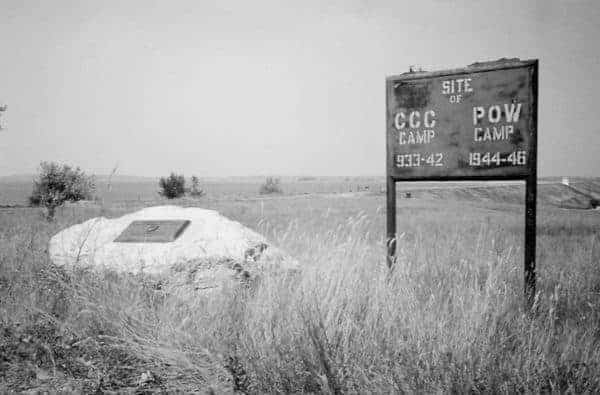We’re all familiar with the vast network of concentration camps and Prisoner of War camps the Nazis operated during World War II. Unthinkable suffering and tragedy befell millions of men, women, and children in camps all over Europe. Soviet work camps, known as gulags, also imprisoned countless unfortunate souls who were sent to the far reaches of Siberia to toil away under harsh circumstances.
It might surprise you to learn that there was also a large collection of Prisoner of War camps scattered throughout the United States that primarily housed German soldiers. In fact, over 400,000 German soldiers lived in 700 POW camps in the U.S. during World War II. These camps stretched from California to Maine.

German POWs were forced to work in the U.S., but the consensus among these prisoners was that the camps in America were “firm but fair.” Prisoners worked in fields and in factories, toiling away and hoping and praying for the war to end. Many German soldiers settled down in the United States after the war ended in 1945 and created a new life in America.
Unfortunately, there is one large historical black mark on the legacy of Prisoner of War camps in the United States, an isolated incident that claimed the lives of 9 German POWs. The tragedy occurred on July 8, 1945, at a camp in Salina, Utah. The war in Europe had ended two months earlier in May, and the roughly 250 Germans being held in Salina were working the fields for the upcoming summer harvest. The Nazi soldiers lived in tents on the edge of Salina and were waiting to be sent home to Germany.

Guard duty at a POW camp was not seen as a desirable job among U.S. soldiers. One historian concluded that men who were assigned such duties were typical “of low mentality, non-intellectual, who could neither understand nor see the reason for the Geneva Convention. Many drank and went AWOL. They read comic books rather than listen to news. They liked to think of themselves as heroes, their one desire being ‘to shoot a Kraut.'”
Army Private First Class Clarence Bertucci had not seen combat action during World War II, but he had a deep-seated hatred toward Germans. His overseas military experience during the war consisted of an 8-month stint in England. Bertucci was born in New Orleans in 1921 and was a sixth-grade dropout. He enlisted in the Army in 1940.
Bertucci had been court-martialed on two separate occasions during his time in the Army, and he was known to have a discipline problem. Bertucci admitted to people that he had felt “cheated” out of his chance to kill Germans during the war and that he said, “someday I will get my Germans; I will get my turn.”

